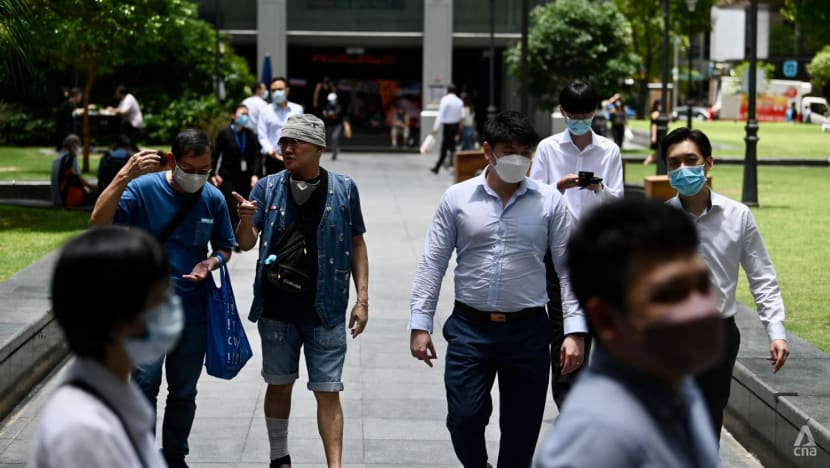- Joined
- Oct 3, 2016
- Messages
- 35,356
- Points
- 113
Singapore
Singapore

People seen at the Central Business District (CBD) in Singapore on Mar 29, 2022. (Photo: CNA/Marcus Mark Ramos)
Listen to this article
7 min
New: You can now listen to articles.

This audio is generated by an AI tool.

Davina Tham
23 Apr 2024 05:11PM
BookmarkShare
SINGAPORE: Flexible work arrangements have become a talking point in recent days with the launch of guidelines for employers to fairly consider such requests.
And as Singapore looks to normalise flexible work arrangements, ensuring that the local workforce stays competitive in skills, productivity and work ethic will be key, Minister of State for Manpower Gan Siow Huang said on Tuesday (Apr 23).
At the same time, mixed workforces combining local and overseas staff are likely to be part of the future of work, employers' associations said, given the difference in labour costs.
Ms Gan and representatives from the Singapore National Employers Federation (SNEF) and the Association of Small and Medium Enterprises (ASME) were speaking to the media a week after the launch of new tripartite guidelines on requests for flexible work arrangements.
From December, Singapore will require all employers to fairly consider employees’ requests for flexible work arrangements. This is aimed at making it easier for some workers, such as caregivers and seniors, to remain in or return to the workforce amid Singapore’s tight labour market and ageing society.
But some employers told CNA that as managing remote teams becomes more common, they may rethink hiring local staff and look overseas for recruitment, particularly given the difference in costs.

Another area in which they must remain competitive is their work ethic or “the softer things, like being reliable, trusted”, which are attributes of the local workforce that businesses appreciate, she said.
“These are the … positive things that we have to continue to sharpen for our Singaporeans to remain competitive and to be in demand,” she said.
Ms Gan noted that many companies practised hybrid work arrangements during the COVID-19 pandemic out of necessity, and many would continue to do so even without the guidelines as it made sense for their business.
Yet many companies also still hired locally after the pandemic. This was because apart from the competitiveness of local workers, in-person interaction was needed for collaboration and teamwork, she said.
Mr Ang Yuit, president of ASME, said that businesses were already looking to build mixed workforces combining local and offshore talent before the guidelines were announced, and that this was “a natural situation given the cost differential” in hiring.
He added that mixed workforces will increasingly be the case in more companies, and that such “multination” arrangements will be part of the future of work.
Tripartite partners hoped that the flexible work arrangement guidelines would allow local manpower to be more effectively deployed within the companies that require it, he said.
The guidelines “hopefully allow companies and staff to provide that degree of flexibility and agility to target where the pain points of businesses are and effectively plug those gaps”, he added.
Ensuring local workers stay competitive is key to normalising flexi-work: Gan Siow Huang
BookmarkShareSingapore
Ensuring local workers stay competitive is key to normalising flexi-work: Gan Siow Huang
Mixed workforces of local and overseas staff are already a natural part of Singapore's economy and will be part of the future of work, say tripartite partners.
People seen at the Central Business District (CBD) in Singapore on Mar 29, 2022. (Photo: CNA/Marcus Mark Ramos)
Listen to this article
7 min
New: You can now listen to articles.

This audio is generated by an AI tool.

Davina Tham
23 Apr 2024 05:11PM
BookmarkShare
SINGAPORE: Flexible work arrangements have become a talking point in recent days with the launch of guidelines for employers to fairly consider such requests.
And as Singapore looks to normalise flexible work arrangements, ensuring that the local workforce stays competitive in skills, productivity and work ethic will be key, Minister of State for Manpower Gan Siow Huang said on Tuesday (Apr 23).
At the same time, mixed workforces combining local and overseas staff are likely to be part of the future of work, employers' associations said, given the difference in labour costs.
Ms Gan and representatives from the Singapore National Employers Federation (SNEF) and the Association of Small and Medium Enterprises (ASME) were speaking to the media a week after the launch of new tripartite guidelines on requests for flexible work arrangements.
From December, Singapore will require all employers to fairly consider employees’ requests for flexible work arrangements. This is aimed at making it easier for some workers, such as caregivers and seniors, to remain in or return to the workforce amid Singapore’s tight labour market and ageing society.
But some employers told CNA that as managing remote teams becomes more common, they may rethink hiring local staff and look overseas for recruitment, particularly given the difference in costs.
Related:

'Singaporeans need to level up': Companies say flexi-work could push them to hire overseas
Asked to respond to these concerns, Ms Gan said that the competitiveness of Singapore’s workforce was key. Local workers must have in-demand skills and be able to meet business productivity needs.Another area in which they must remain competitive is their work ethic or “the softer things, like being reliable, trusted”, which are attributes of the local workforce that businesses appreciate, she said.
“These are the … positive things that we have to continue to sharpen for our Singaporeans to remain competitive and to be in demand,” she said.
Ms Gan noted that many companies practised hybrid work arrangements during the COVID-19 pandemic out of necessity, and many would continue to do so even without the guidelines as it made sense for their business.
Yet many companies also still hired locally after the pandemic. This was because apart from the competitiveness of local workers, in-person interaction was needed for collaboration and teamwork, she said.
Mr Ang Yuit, president of ASME, said that businesses were already looking to build mixed workforces combining local and offshore talent before the guidelines were announced, and that this was “a natural situation given the cost differential” in hiring.
He added that mixed workforces will increasingly be the case in more companies, and that such “multination” arrangements will be part of the future of work.
Tripartite partners hoped that the flexible work arrangement guidelines would allow local manpower to be more effectively deployed within the companies that require it, he said.
The guidelines “hopefully allow companies and staff to provide that degree of flexibility and agility to target where the pain points of businesses are and effectively plug those gaps”, he added.






